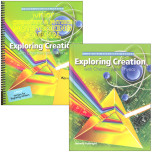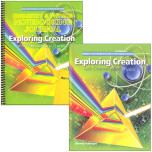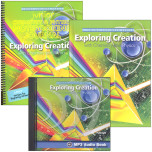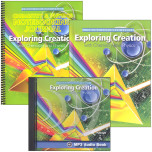We use cookies to make your experience better. To comply with the new e-Privacy directive, we need to ask for your consent to set the cookies. Learn more.
If a tree falls in the forest and no one is present to hear it, does it still make a sound? Exploring this question and countless others is at the heart of this newest course in the Apologia Elementary series. Offering fourteen lessons to be completed at your child's individual pacing, topics covered include a general introduction to chemistry and matter from a Biblical perspective, types of matter, the building blocks of creation, compound chemistry, mixtures, Newton's laws, gravity, forms of energy (including renewable energy), sound, light and spectrum of colors, thermodynamics, electricity, magnetism, simple machines and much more. Hands-on activities abound! Children will make smoke bombs, lava lamps and even create a periodic table from sugar cookies (YUM!). Notebook activities are plentiful in the text book, although an optional notebook is also available to enhance the learning experience. Author Jeannie Fulbright has once again given homeschool families a powerful tool for teaching science to our children. A complete supply list is found at the back of the book, although prepackaged science kits are available for your convenience.
Available for younger students or reluctant writers, the Junior Notebooking Journal requires less handwriting and provides more coloring pages than the original Notebooking Journal. Additional supplements include an audiobook MP3 CD and a Lab Kit packaged by Nature’s Workshop. Most activities require only household items and common supplies. You can gather these for each activity as you go, or purchase the kit for convenience. ~Deanne
















